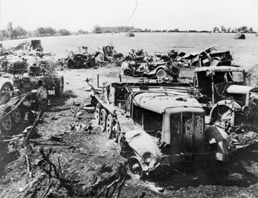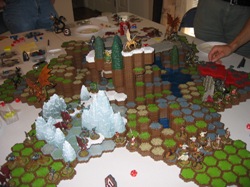Geek Parenting: D6 Thoughts for Tabletop Gamer Parents

At the moment, Kurtzhau and I are trying to flog off 2kg of Halo Megablocs. It’s hundreds of pounds worth of plastic, but we’ll only get a few quid for it because the sets are all jumbled. Worse, he only got 18 months play out of the lot, less out of recent acquisitions. He’s 11 now and Bolt Action and Warhammer 40K have swept away all his toys.
So, this set me thinking about things I wished I known when I started parenting.
1. Your old games are rubbish
Seriously, your old edition of AD&D is unplayable — too many subsystems, too much obscurantism for anybody growing up a digital native. This is also true of those older boardgames that tried to emulate some aspects of role playing, but without the verbal problem solving and character stuff that make RPG worthwhile. In terms of making interesting decisions, Talisman, for example, is not really much better than Snakes and Ladders.
2. Modern games are the best gateway to tabletop gaming

Many modern games are created and tested by adults with some knowledge of user-centered design, and a strong sense of video games breathing down the backs of their necks.
Heroscape, for example, if you can still get it, is pretty much the ultimate gateway to gaming; beautiful figures, buildable terrain, and a system best described as “Top Trumps meets Magic the Gathering but simpler, and with dice and figures”. Even quite young kids can play that, but they can also play cooperation games like Forbidden Desert, which are very close indeed to roleplaying, with each player having their own distinct role in the party.
3. You can start kids on roleplaying and wargaming really early
Kids pick up their tropes with their TV and video games, though you can help this along by getting hold of the old Dungeons and Dragons cartoons and buying them Lego Indiana Jones.
Roleplaying can be just an extension of improvised storytelling. Go from telling the story, to playing “what would you do?” A great way to enliven family walks.
Wargaming — and now we’re probably mainly talking boys — just means adding dice to the battle playset (this happened when Kurtzhau was 5 and I got sick of him knocking over my Playmobil Vikings so made him role the dice first ) and, actually, before that taking turns to move figures, which has the advantage of stringing out the game.
Proper gaming is possible depending on the rules and whether you can act as a buffer between them and your little darlings. FATE games are sufficiently light that they work for surprisingly young kids. My six-year-old daughter quickly “got” the idea of Fate points and Feats.
4. Table-top gaming is educational (if you must)
Apart from being good for the brain, gaming gets children drawing maps, building scenery, wrestling with model kits, painting figures, learning history — I had to write up the Norman local administration system for Kurtzhau’s mate! — reading books… What’s not to like?
5. Table-top gaming can save you money if you treat its figures as toys
This is a trick we missed with the Halo Megablocs.
However from early on, I’ve tended to buy Kurtzhau models rather than military toys. 15mm science fiction figures are fun to paint and much cheaper than Clone Wars action figures. Similarly, the kids round here tend to build and paint Warhammer miniatures well before the roll a dice. The trick is to — with the help of the Internet — paint the figures to a reasonable standard so that they can be gamed with later.
Regarding Halo. There are now a lot of larger scale wargame sets around, some with modular scenery. They’re expensive, but not much more than the equivalent in Megablocs and they have the advantage that your 10-year-old may be still playing with them in 10 years time! I wish I’d pointed Kurtzhau in that direction.
6. Tabletop Gaming is now a gateway to the adult world
Tabletop gaming is now almost respectable. Some very — normal’s not the right word — interesting and together people are gamers. You probably already have a lot of them in your social circle. As soon as your child picks up the polyhedral dice, they’ll have something in common with the older generation…
M Harold Page (www.mharoldpage.com) is a Scottish-based writer and geeky parent of geeky kids. He has several Historical Adventure books in print. His creative writing handbook, Storyteller Tools: Outline from vision to finished novel without losing the magic is available on Amazon. If you live near Edinburgh, Scotland, he would love to teach you how to fight in Medieval German Longsword style.

Very interesting article.
Is that the picture you meant to upload for the Halo megablocks?
I wanted to convey the jumble that is our Halo collection, so I thought the Falaise pocket was about right.
Spot on, Harold, even #1 (though I know that’s heresy in some quarters). Furthermore, I would argue that tabletop games teach logic and programming structure (not to mention the elements of game design), because unlike video games, all the mechanics of a tabletop game are exposed to the players. And unlike most video games, which are code-locked, with tabletop games the players can actually tinker with the data and game processes to create playable (or, for that matter, unplayable) variants.
This principle is why I had so much success at game studio startups in the ’80s and ’90s hiring game designers out of the tabletop game biz to design videogames: even though they’d never designed a computer game before, they already had the required skill set.
Absolutely Lawrence! I ended up a techwriter in part because of the time I spent creating homebrewed RPGs.
In school we always read the Homeric tales and last year for the project I had the students do a war game scenario with the Greeks versus the Trojans. It was a blast making and coloring the army pieces. They were paper miniatures but the students went hog wild over Achilles, Ajax, and Hector. I used the basic Warhammer rules. Your theory is spot on. Long after the segment the students looked at day as one of the memorable moments of the year. The thing is they ended up doing all kinds of research over history and such long after the paper miniature battle and quite a few ended up playing miniature games. (Warmachine, Warhammer 40K, and Axis and Allies were their favorites)
If you want to build critical thinking RPGs and wargaming REQUIRE it. It is a “Trojan Horse” to get them to put down their cellphones and dig into their literature, map out their rulebooks with technical writing, and doing real research.
Another awesome response. I think the comments on this thread deserve their own blog entry.
[…] a recent post, M. Harold Page gave some thoughts for gamer parents which I found very helpful. Particularly that instead of focusing on our old games, we should look […]